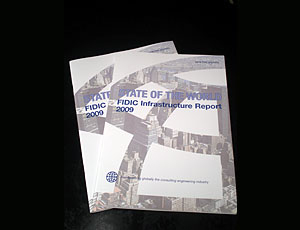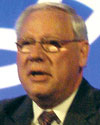Unfolding impacts of worldwide infrastructure are putting acute pressure on the engineering profession to steer future development onto a more sustainable path, said global practitioners meeting Sept. 14-16 in London. The warnings came at the annual conference of the International Federation of Consulting Engineers, at which the group, which represents close to one million global engineers, released its first “state of the world” report. Hundreds of delegates from all continents were urged to take a leadership role to find ways to curtail future negative effects.

“We meet...at a time when the damage we have been doing to our world has become clear, and...the need to take action is even clearer,” said Geoff French, chair of both Scott Wilson Group PLC., Basingstoke, U.K., and of the country’s Association for Consultancy and Engineering. Among the report’s statistics he cited are global population growth and urbanization is generating the equivalent of a city of nearly two million people every two weeks, and one billion people lack access to adequate water supply.
Engineers are not doing enough, said John Boyd, FIDIC chairman and former president of Golder Associates Ltd., Mississauga, Ontario. “Everywhere we look we see the need to do better,” he noted. “Our industry designs a little more than 50% of the world’s infrastructure. To make progress and deliver a better form of infrastructure, we’re the guys that have got to do it, and at the moment...we’re not.”
Climate change is making the most pressing demands on the profession, claimed Keith Clarke, CEO of WS Atkins PLC, Epsom, U.K. “The starting point is [that] climate change is real. We are no longer into the odd bit of mitigation,” he asserted. “Our role now is to start to design in decarbonization in all our projects.”
With no time to develop more complete standards, which the engineering profession tends to prefer, designing to reduce greenhouse-gas emission must be iterative, with standards constantly changing, said Clarke. “The next decade is our chance, and that’s the good news,” he said.

Since developing countries will press to build polluting powerplants to fuel their own economic development, “our industry has to provide leadership,” urged Gregs Thomopulos, chairman and CEO of Stanley Consultants Inc., Muscatine, Iowa, and incoming FIDIC president. “We have to come up with...innovation in technologies that will reduce the release of carbon dioxide into the air. Then we have a chance. If we leave it to the political institutions in these countries, I don’t think they are going to stop building coal-fired powerplants.”
Developing countries such as South Africa have “sought from the engineering community a partnership on how to define a way forward,” said Brian Bruce, CEO of South African contractor Murray & Roberts (Pty.) Ltd., Johannesburg. “When society gets used to its infrastructure, it forgets what has brought it there in the first place,” he noted.
In Africa, where infrastructure is not taken for granted, “built-environment professionals have now become valued by society,” Bruce pointed out. The continent is home to many people among those who make up “half the world” who have not benefited from the last 1,000 years of infrastructure investment, he said.
Sustainability “applies as much to corporations as to societies,” commented Ian Tyler, CEO of Balfour Beatty PLC, London. “It means behaving...as though we intend to be here for the long term.” For corporate survival to emerge from the current global economic crisis, good environmental management, health and safety, as well as business integrity practices provide “clear competitive advantage,” he said.


Post a comment to this article
Report Abusive Comment